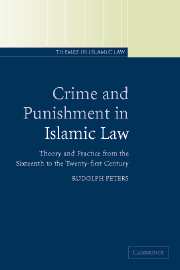 Crime and Punishment in Islamic Law
Crime and Punishment in Islamic Law Published online by Cambridge University Press: 23 November 2009
INTRODUCTION
In this chapter I will discuss and analyse the classical doctrine of criminal law as found in the authoritative works of jurisprudence. I will pay attention to the various schools of jurisprudence (madhhab, plural madhāhib), including Shiite doctrine, and try to present the authoritative opinions of each school. This may seem somewhat confusing to the reader but it is necessary, first in order to convey how rich and variegated the legal discourse is, and second because I will refer to these opinions in the following chapters. To avoid further confusion, I will refrain from paying attention to the historical development of the doctrine, although I am well aware that the doctrine was not static and immutable. However, this is only recently recognised and there are still many gaps in our knowledge.
In order to make the variety of opinion manageable in practice and to impose some sort of order on it, two devices were used. The first and older one is the institution of the school of jurisprudence. Scholars tracing their doctrine to the same early authority regarded themselves as followers of the same school. Ultimately, there remained four of them in Sunni Islam: the Hanafites, Malikites, Shafi῾ites and Hanbalites. These schools had, to some extent, a regional distribution: for instance, North Africa and Islamic Spain adhered to the Malikite school, Central Asia and the territory occupied by the Ottoman Empire was dominated by the Hanafites.
To save this book to your Kindle, first ensure [email protected] is added to your Approved Personal Document E-mail List under your Personal Document Settings on the Manage Your Content and Devices page of your Amazon account. Then enter the ‘name’ part of your Kindle email address below. Find out more about saving to your Kindle.
Note you can select to save to either the @free.kindle.com or @kindle.com variations. ‘@free.kindle.com’ emails are free but can only be saved to your device when it is connected to wi-fi. ‘@kindle.com’ emails can be delivered even when you are not connected to wi-fi, but note that service fees apply.
Find out more about the Kindle Personal Document Service.
To save content items to your account, please confirm that you agree to abide by our usage policies. If this is the first time you use this feature, you will be asked to authorise Cambridge Core to connect with your account. Find out more about saving content to Dropbox.
To save content items to your account, please confirm that you agree to abide by our usage policies. If this is the first time you use this feature, you will be asked to authorise Cambridge Core to connect with your account. Find out more about saving content to Google Drive.